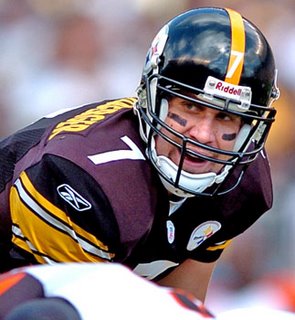
Heavy load?
By Scott BrownTRIBUNE-REVIEW
Sunday, October 1, 2006
Yet, there may be forces at work that not even Roethlisberger can comprehend, forces that have led or at least contributed to the two subpar showings he has recorded in consecutive Steelers losses.
One psychiatry expert said Roethlisberger may be suffering from post-traumatic stress disorder (PTSD), which can lead to feelings of anxiety and being overwhelmed.
Another said the adrenaline that has always worked for Roethlisberger may now be working against him due to biological changes over which Roethlisberger has no control.
One thing that can not be disputed is Roethlisberger has been through a lot since becoming the youngest quarterback ever to win the Super Bowl.
A little more than three months after celebrating his 24th birthday in March, Roethlisberger lost his aura of invincibility and nearly his life in a motorcycle accident. His injuries included multiple facial fractures and required seven hours of surgery at Mercy Hospital.
He reported to training camp in July on time, but less than a week before the Steelers' season opener, Roethlisberger had an emergency appendectomy.
"You start adding up his trauma, somewhere you've got to figure his stress level is increased," said Dr. Ron Knause, a sports medicine psychiatrist who is based in the Tampa Bay area. "Without a doubt."
Knause has worked with professional athletes for years, specifically on working through off-the-field issues in order to maximize their performance on the field.
Knause, who once traveled with the USFL's Tampa Bay Bandits for this very purpose, said Roethlisberger may have PTSD. That, he added, could be affecting him on the field, especially since his position demands that he make split-second decisions on a regular basis.
Through his first two games, Roethlisberger has thrown five interceptions and no touchdowns and completed just under 50 percent of his passes.
His passer rating is 34.3, which is 64.3 points less than it was in 2005 when Roethlisberger finished third in the NFL in the category.
"He may have anxiety that would impair his ability to perform at peak performance levels that he was able to do previously," Knause said.
Dr. Kevin Guskiewicz, who served as a graduate assistant athletic trainer with the Steelers in the late 1980s and early 1990s, believes Roethlisberger is in good hands with the team's medical personnel.
"In my opinion, he's getting the best care he could be getting anywhere in the country," said Guskiewicz, who is the director of the sports medicine research laboratory at the University of North Carolina. "I'm sure if there were any lingering (effects), they would be picking up on them."
Steelers doctors could not be reached for comment on this story.
Len Genduso, a psychotherapist at Columbia Presbyterian Hospital in New York City, said it is hard for anyone to fathom what Roethlisberger has been through, Roethlisberger included.
How his brain has processed what has happened to him is something that could be hindering Roethlisberger on the field, Genduso said. Given the trauma he experienced in the span of about four months, Roethlisberger could have undergone a significant biochemical change and not even know it, Genduso said.
He said that the excitement of anticipation and the terror associated with trauma are on the same emotional continuum.
What Roethlisberger has been through may have led to some re-wiring in his brain, Genduso said, and the adrenaline he now gets before games subconsciously tells him that his body is in danger of imminent trauma.
"He may be having a lot of effects even if he's not having flashbacks," Genduso said.
Knause said the motorcycle accident and appendectomy left Roethlisberger with physical, mental and emotional damage.
"I'll bet 10 to 1 nobody ever looked at his emotional component," Knause said.
A major reason for that, he said, is the culture of football.
Players are programmed to be tough, and Roethlisberger has long sported the prototypical rugged look with his sturdy build and ample facial hair.
Sometimes that toughness masks denial, Knause said, pointing to the recent case of Tampa Bay Buccaneers quarterback Chris Simms.
Simms took a beating last Sunday, yet he kept playing even though he later had to be rushed to a hospital and have his spleen removed.
Knause said Roethlisberger could be in denial over some emotional issues from the motorcycle accident and appendectomy.
"All his training is 'I'm fine,' " Genduso said. "He could have PTSD and not be fully aware that he's suffering the effects of it."
That could be revealed in various forms of talk, behavioral and cognitive therapy.
That he is even playing is "incredible," said Dr. John Corrigan, a rehabilitation psychologist and the founder of the Ohio Valley Center for Brain Injury.
"I think it's been documented what he's been through," Steelers coach Bill Cowher said "but, again, he's a very resilient young man."
Roethlisberger is also a confident one. At least on the surface.
Three days after the loss to the Bengals, Roethlisberger said the 1-2 Steelers would be a different team coming off the bye week. But he stopped just short of saying he is back to where he was physically and mentally before the motorcycle accident.
"I'm working out, and I really feel good about where I'm at," Roethlisberger said. "Coach wants me to put on a little more weight, but I feel good with where I'm at right now."
Scott Brown can be reached at sbrown@tribweb.com.


No comments:
Post a Comment